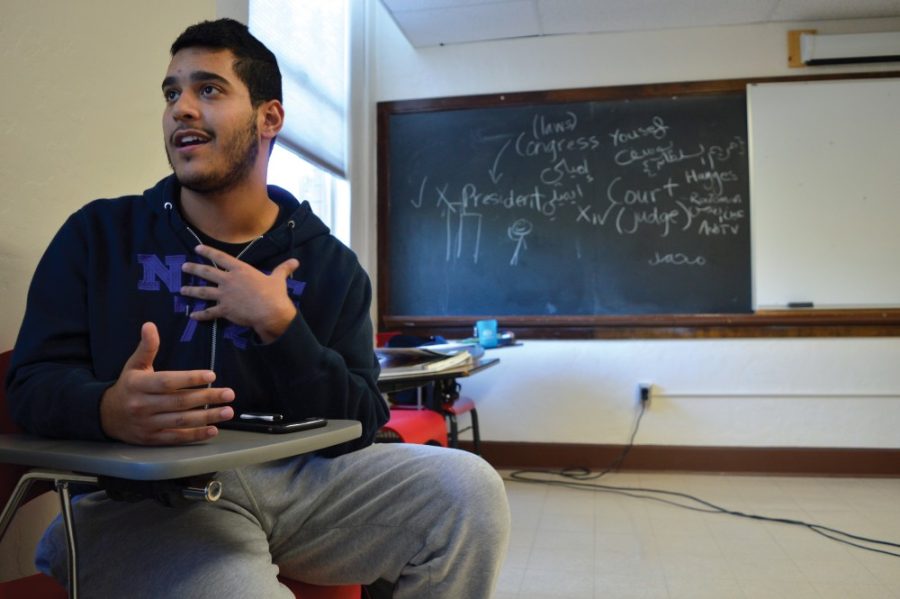International students at the UA weighed in with their perspectives on gun violence in the U.S., an issue that has become more and more prevalent in recent years.
The UA has a large international student presence on campus. According to the UA 2014-2015 Fact Book, 3,696 international students attended the UA in 2014—about 8.7 percent of the student population.
Max Reid, an international exchange student from Australia at the UA for the fall semester, said U.S. gun laws are strikingly different from Australian gun laws.
Australia enacted stricter gun laws after a mass shooting in 1996 that resulted in the deaths of 35 and left 23 injured, according to a New York Times article. One of the more prominent aspects of Australia’s stricter gun regulation was the government buying back guns from citizens after the ban was passed.
Weapons have to be kept in a safe at all times, and people who want to purchase a gun have to apply for a license and then apply for a background check, Reid said. Those interested in purchasing guns also have to state their intention for using the gun; for example, Reid said, his friend lives on a farm in Australia and so he was able to acquire a rifle, but not a hand gun.
“I think Australia generally is very scornful of the U.S.,” Reid said. “I think it’s ingrained in the U.S. culture, it seems … that to protect yourself from the government you need weapons, and it’s in your Constitution.”
Reid said he feels that the chance of him getting shot is higher in the U.S. than back home in Australia, but added that he isn’t concerned living here.
Regarding the most recent mass shooting at Umpqua Community College, Reid said he feels the same way as every other shooting and that he has become desensitized to the matter.
“I always just get the same thought, like, ‘Is this gonna change? Are they gonna do something about it?’ ” Reid said.
Yuan Tian, a psychology sophomore from China, said that regarding guns, the culture in the U.S. is different than in China.
Gun violence isn’t because of the Second Amendment, Tian said, but because of the culture surrounding mental and social disorders.
China’s outlook on U.S. gun laws, Tian said, is that the U.S. is crazy.
“I’m not nervous because I know normal people with guns don’t shoot at each other,” Tian said.
Private gun ownership is banned in China under the Firearms-Control Legislation and Policy with only two exceptions, according to the Library of Congress.
The exceptions: official use and permitted civilian use.
“Firearms for civilian use are permitted for specified ‘work units’ in three areas: sports, hunting, and wildlife protection, breeding, and research,” the website states.
For other international students, it’s the right to carry guns that leads to mass shootings in the U.S.
Yusif Dashti, who is not yet a UA student but enrolled in an English class through the Center for English as a Second Language, is from Kuwait and said the Second Amendment is the reason for mass shootings in the U.S.
According to Dashti, civilians cannot own guns in Kuwait—except for hunting in which fake bullets are used. Some civilians still own guns for self-defense from during the Iraqi invasion of Kuwait, Dashti said.
Dashti recalled when he went to purchase a car in the U.S. and saw a man carrying a gun in his pocket. Initially scared, Dashti said he wanted to know why the man had a gun and decided to go talk to him.
Dashti said the man told him that he was in the Army years ago, has knowledge about guns and that’s why he was carrying it.
Mohammed Albori, another student from the same ESL class who moved from Saudi Arabia to Tucson five months ago, shared the same viewpoint as Dashti.
“Because of the right to [bear arms], it’s more likely to cause them to shoot people. … Basically it’s about having the gun or not,” Albori said.
In Saudi Arabia, Albori said guns are prohibited without a license. Civilians can use rifles with fake bullets for hunting, but cannot be armed with real guns, and only certain people can apply for licenses, he said.
In his home country, Albori heard that there was a lot of crime in the U.S. and that it wasn’t safe, but upon being here, he said he feels safe and really enjoys being here.
Ching Yu, who came to Tucson from Taiwan two weeks ago and is in the same ESL class as Dashti, plans to apply to the UA for her master’s degree in marketing.
Yu said that in Taiwan, civilians cannot own guns and that only the police can carry guns.
“I think it’s quite dangerous here because I saw on the news that someone ran into a school, used a gun and shot everywhere,” Yu said.
Regarding the gun culture in the U.S., Yu said that guns are a way for people to defend themselves.
“I think it’s a way to keep yourself safe because if someone [is] using a gun [and] points it at you, you may take a gun and point at him,” Yu said.
Follow Meghan Fernandez on Twitter.









